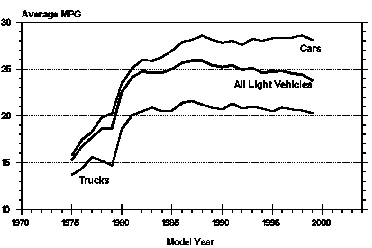 |
|||||||
|
|
|
|
|

|
SUVs Increase Our Oil Addiction, Threaten Our Wilderness and Coasts
The Exxon Valdez disaster serves as a powerful reminder that transporting oil also threatens our environment. Smaller spills and leaks occur daily, putting waterways and wildlife at risk. Worsening our Energy Security Every day America consumes 18 million barrels of oil. We import nearly half of this oil (the same amount guzzled by cars and light trucks) from politically volatile regions. Our oil imports add $50 billion to the U.S. trade deficit annually. Due to the increasing number of gas-guzzling vehicles, America is more dependent on foreign oil now than we were at the height of the 1973 energy crisis. Congress passed the Corporate Average Fuel Economy (CAFE) standards in 1975 to reduce our dangerous oil dependence. This doubled the fuel economy of America's vehicle fleet, saving 3 million barrels of oil per day. However, the oil savings from CAFE standards are being eroded by people driving farther and the rising proportion of inefficient SUVs and other light trucks. In fact, the average fuel economy of new vehicles has sunk to the lowest level since 1980. Raising the CAFE standard for light trucks to equal that of cars (27.5 mpg) would save 1 million barrels of oil per day. We can do even better. Raising the average for cars to 45 mpg and light trucks to 34 mpg would save 3 million barrels of oil per day.
Available technology and higher mileage standards could make the popular Ford Explorer a 34.1 mpg vehicle, rather than a 19.3 mpg guzzler, without compromising performance or safety. This "improved" Explorer could emit 43 percent less global-warming pollution and 76 percent less smog-forming pollution and cost only $935 more. Consumers would save several times this at the gas pump over the life of the vehicle. Industry Foot-Dragging and Excuses History shows that automakers won't improve the environmental performance of their products unless they are required to put technology to work. Raising CAFE standards is the key to cleaning up SUVs and other light trucks. In 1974, a Ford official testified before Congress that CAFE standards would "result in a Ford product line consisting of either all sub-Pinto-sized vehicles or some mix of vehicles ranging from a sub-sub-compact to perhaps a Maverick." Today, automakers use similar arguments against improving CAFE standards for SUVs. The claim wasn't true then; it isn't true today. Eighty-six percent of the fuel-economy improvements for cars have resulted from improved technologies such as more efficient engines and transmissions and better aerodynamics. In July 2000, Ford promised to use technology that will improve its SUVs' fuel economy by 25 percent over five years. General Motors pledged to exceed Ford's light-truck fuel economy. Keeping these promises will begin the process of cleaning up SUVs. But Detroit continues to fight higher CAFE standards for light trucks and cars, which would guarantee these and other improvements. The auto industry has taken its fight to Congress, getting its friends to fight legislation that would increase fuel economy. Beginning in 1995, Congress froze CAFE standards at levels set decades ago. The
SUV Threat | Pollution
| Energy
Security | Safety Up to Top |
 A hidden cost of SUVs is the price we pay with
our natural resources. To keep these gas guzzlers running, oil
companies seek to drill in new areas—including some of our nation's
most sensitive wilderness habitats. As the number of gas guzzlers on
the road grows, so does the pressure to drill in Alaska's Arctic
National Wildlife Refuge—one of the last remaining pristine
ecosystems. Fragile coastlines in California and Florida, and lands
surrounding Yellowstone National Park are also targets for
drilling.
A hidden cost of SUVs is the price we pay with
our natural resources. To keep these gas guzzlers running, oil
companies seek to drill in new areas—including some of our nation's
most sensitive wilderness habitats. As the number of gas guzzlers on
the road grows, so does the pressure to drill in Alaska's Arctic
National Wildlife Refuge—one of the last remaining pristine
ecosystems. Fragile coastlines in California and Florida, and lands
surrounding Yellowstone National Park are also targets for
drilling.